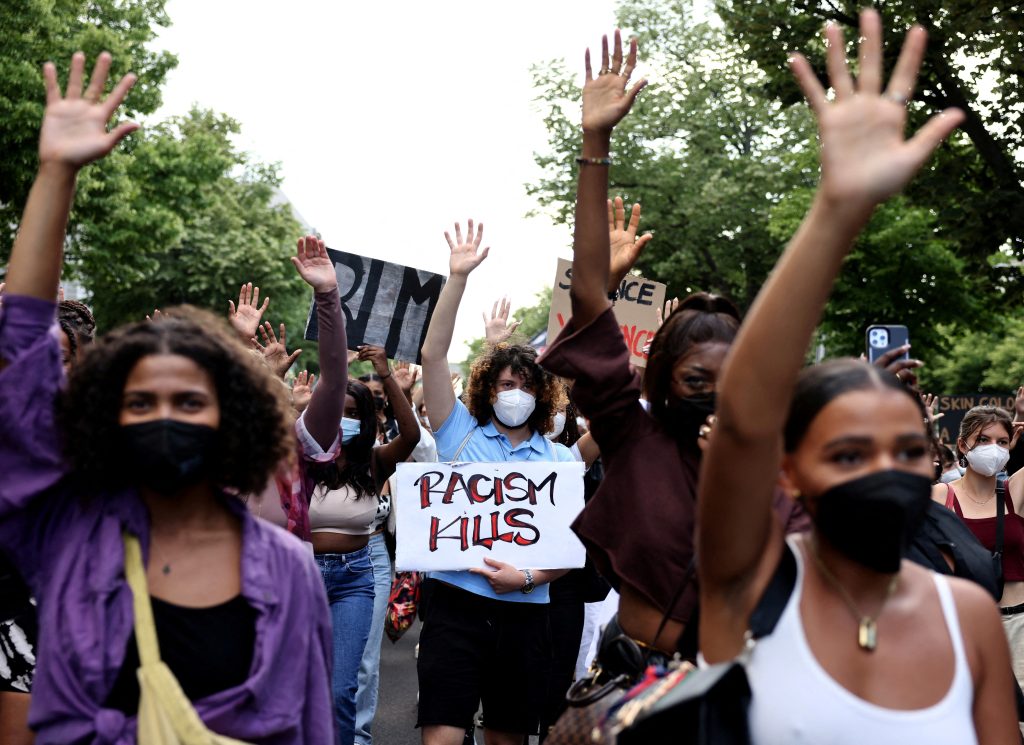In the summer of 2020, as Germany lifted its first lockdown during the COVID-19 pandemic, Omar Diallo and two friends were excited to celebrate Eid al-Adha, the Muslim festival of sacrifice. Diallo, a 22-year-old migrant from Guinea in West Africa, recalled the evening while speaking with the Associated Press in Erfurt, the capital of Thuringia, a state in eastern Germany. He and his friends were “enjoying life, playing music, and walking through the city” when the night took a terrible turn.
As they passed through a park near an old, run-down building, they were confronted by three men dressed in black. The men shouted at them, saying, “What are you doing here, you foreigners? Get out!” As Diallo remembers, more men joined the group, leaving no escape for him and his friends.
Diallo can’t recall how long the chase lasted, but he managed to call the police. When officers arrived, the attackers fled. One of Diallo’s friends, also from Guinea, was beaten so badly he had to be hospitalized.
Being Black in Germany often comes with the risk of facing racism, ranging from everyday insults to violent attacks. Experts say that Black people in eastern Germany, in particular, are at an even higher risk of experiencing such racism.
While West Germany became a more diverse and democratic society after World War II, East Germany, which was a communist dictatorship until 1989, had limited contact with other ethnic groups and restricted travel abroad. In Thuringia, radical far-right groups have fostered a hostile environment toward minorities, including Black people.
In 2023, an NGO called Ezra, which supports victims of racist and far-right violence, documented 85 racist attacks in Thuringia. In 2022, they recorded an “all-time high” of 88 such attacks. The increase in violence is linked to a growing extreme-right movement in Thuringia, which has fueled radicalization. The far-right Alternative for Germany (AfD) party has also gained significant political power in the region.
In the upcoming elections on September 1, 2023, as many as 30% of voters in Thuringia plan to support the AfD, according to polls. Similar trends are seen in Saxony and Brandenburg, where the AfD leads in the polls. The AfD’s Thuringia branch is particularly radical and has been under official surveillance by the domestic intelligence service for four years as a “proven right-wing extremist” group.
The AfD’s anti-immigrant rhetoric has raised alarm among those fighting discrimination, especially among visible minorities such as Black Germans and African migrants, who are often the first targets of discrimination. Doreen Denstaedt, Thuringia’s minister for migration, justice, and consumer protection, expressed concerns about the growing right-wing influence. As a woman of mixed heritage—her father was from Tanzania, and her mother was German—she has experienced racism firsthand.
Denstaedt, who grew up in Thuringia, said that she was always the only Black child in her community during her childhood in East Germany. Her family never let her walk home alone due to fear of racist attacks, and she frequently endured racial slurs at school. Even though she was born in Germany, people still called her a “foreigner.”
Denstaedt worries that racist views are becoming more accepted in society due to the political climate. She believes that repeating racist narratives makes them more mainstream and acceptable. Although Black people are a small minority in Germany, their presence in the country dates back hundreds of years.
Exact statistics on the Black population in Germany are not available, but it is estimated that around 1.27 million people of African descent live in the country, which has a total population of 83 million. More than 70% of Black Germans were born in the country. Germany’s colonial past, which included territories in Africa such as Tanzania, Cameroon, and Ghana, is only now being acknowledged by the government.
Daniel Egbe, a Cameroonian chemist who moved to Thuringia in 1994, said he was shocked by how little Germans knew about the country’s colonial history regarding Black people. Egbe, who became a German citizen in 2003, founded an organization called AMAH, which supports African migrants and students in Thuringia who face discrimination.
Omar Diallo, who was attacked in Erfurt in 2020, remains committed to improving the situation for Black people in Germany. Although the attack left him traumatized, it also motivated him to fight for justice. A year ago, he began studying law at a university in Munich, but he continues to visit Erfurt to protest for migrant rights and against racism.
Egbe shares concerns about the rise of the far-right AfD but insists that he will not leave Thuringia, even if racism worsens. “Even if the worst happens, we will stay here. We will not leave, and we must do our part to change this society,” he said.




















